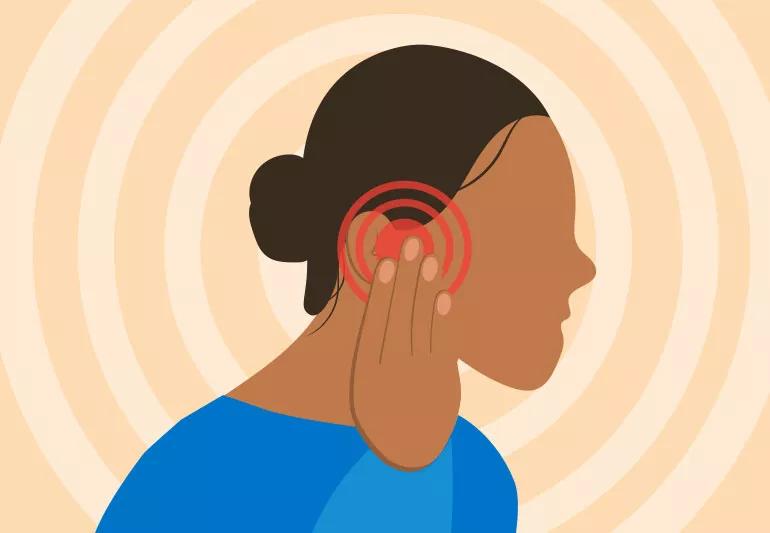Ear infections can be painful, but essential oils may make the problem worse

Image content: This image is available to view online.
View image online (https://assets.clevelandclinic.org/transform/4c2403b3-76ec-4f97-aff6-a99a1c36ddb8/person-Head-Ear-Ache-1445783798-770x533-1_jpg)
Person suffering from an ear ache.
If you or your child have an ear infection, the painful earache may seem unbearable. It’s natural to want to do something to take away the pain.
Advertisement
Cleveland Clinic is a non-profit academic medical center. Advertising on our site helps support our mission. We do not endorse non-Cleveland Clinic products or services. Policy
Some people turn to essential oils to alleviate the ache, but are they safe for your ears? Jessica Ruff, MD, a wellness and preventive medicine physician, cautions against this, and shares what you need to know about this unconventional treatment for ear infections.
Essentials oils, which are compounds that give plants their fragrance, may be useful for aromatherapy and improving your mood. But scientific studies don’t support using them for ear infections. In fact, essential oils may worsen an ear problem or cause lasting damage. Consider these facts:
Some essential oils may have bacteria-killing (antimicrobial) properties. But placing drops of essential oil into your ear won’t help a bacterial ear infection. “These infections tend to occur in your middle ear, the air-filled space between your eardrum and inner ear,” explains Dr. Ruff. “Your eardrum prevents the drops from reaching the site of the infection.”
If you or your child have an ear infection (otitis media) that doesn’t improve after two or three days, see a healthcare provider. They can figure out if you have a bacterial ear infection that needs antibiotics. This oral medication circulates throughout your body to kill the bacteria causing the ear infection.
Advertisement
Swallowing an essential oil won’t have the same antibiotic effect either. More importantly, essential oils — especially full-strength oils — can be poisonous and potentially deadly when ingested. That’s why you should keep all essential oils out of children’s reach.
Because of their powerful concentrations, never use pure essential oils straight from the bottle. Instead, mix drops of the essential oil with another oil (called a carrier oil) to weaken or dilute it.
Even after you dilute an essential oil, it’s possible to have an allergic reaction to the mixture when it touches your skin. Some people develop painful blisters and rashes that need medical attention.
Drops of oil directly into your ears may cause even worse reactions. “The oil could burn the delicate tissue of your eardrum, causing irreversible damage,” warns Dr. Ruff. It also isn’t a good idea to stuff an oil-soaked cotton ball into your ear. The oil can still drip into your ear canal.
Using essential oil eardrops on a ruptured eardrum can be especially dangerous. “The oil can seep through the tear or opening in the eardrum, causing severe pain and pressure,” she adds.
At a minimum, essential oil eardrops can clog your ears, creating that uncomfortable, muffled, “I can’t hear you” sensation. Or worse, you may develop ototoxicity, a type of inner ear damage caused by treatments.
Ototoxicity can cause:
Young children with ototoxicity may have difficulty:
Essential oils aren’t food or medicine, so the U.S. Food and Drug Administration (FDA) doesn’t regulate them for safety or efficacy. “The bottle of essential oil might not contain what’s on the label,” cautions Dr. Ruff. “The oil may have impurities or have more or less of the concentrated amount listed on the label.”
Due to the lack of research on essential oil safety and risks, experts like Dr. Ruff also don’t recommend using essential oils in any manner on children younger than 6. Pregnant and breastfeeding women should avoid using essential oils, too. “There are simply too many unknowns about the health risks of essential oils,” she says.
If you’re looking for safer, natural ways to ease an earache until the infection clears, Dr. Ruff recommends these home remedies for ear infections:
Advertisement

Sign up for our Health Essentials emails for expert guidance on nutrition, fitness, sleep, skin care and more.
Learn more about our editorial process.
Advertisement
You can find sweet relief by swallowing, yawning and doing specialized maneuvers
Yes, ear pain can result from seasonal allergies, causing even more issues
Turning your head to the side and pulling your ear up and back is one common tactic for relief
Ear plugs, bathing caps, hydrogen peroxide and hair dryers can all help keep ears clean and dry
Not all ear infections need antibiotics — cold and warm compresses and changing up your sleep position can help
Throat and ear pain that lasts more than four weeks deserves serious attention
How to find a fix for the itch
And two remedies to avoid at all costs
Prioritize your health by managing stress, strengthening your social connections and getting quality sleep
Bolsters, blankets, pillows and blocks can offer extra support, stability and comfort
Allergies, postnasal drip, asthma or reflux could be to blame for a cough that won’t quit